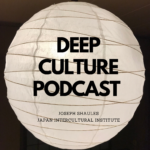
In this episode, Joseph Shaules and Yvonne van der Pol talk about cognitive biases – the “natural” mental shortcuts that make us jump to conclusions, misjudge, favor the familiar, be ethnocentric, and more. Cultural bridge people need to understand cognitive biases because they are so often triggered in intercultural situations. You will hear a story about a bicycle from Yvonne, and we even discuss the bhavacakra—The Buddhist Wheel of Life. It reminds us that waking up to the biases within us is an important step towards deeper intercultural understanding.